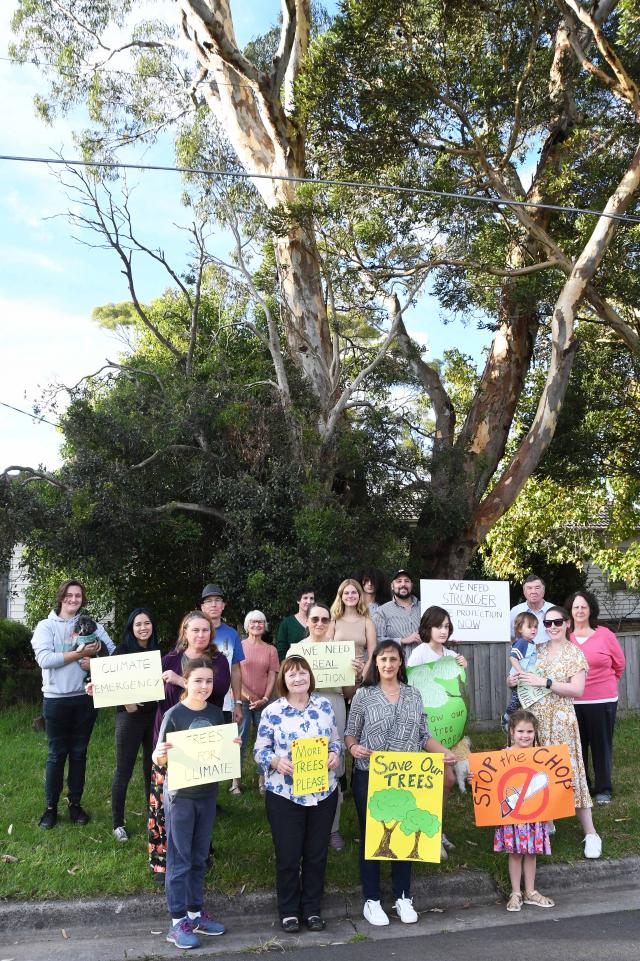
By Cam Lucadou-Wells
Environmentalists are calling for Greater Dandenong Council to significantly strengthen its draft tree protection law.
Greater Dandenong Environment Group argues the proposal to protect trees in private yards is like “Swiss cheese”, riddled with loopholes and will make no “real difference”.
“It only applies to trees that are over 10 metres high, which is a major problem as only two per cent of trees on private land in Greater Dandenong are over that height,” GDEG president Isabelle Nash said.
“There are also so many exemptions to the proposed local law to make it unenforceable.”
Other weaknesses include offenders illegally removing trees being able to avoid a fine by planting a tree in its place – “a new tree that will take 15-20 years to provide the same canopy cover”, Ms Nash said.
She also contested the exemption for trees that are ‘weed species’ such as the lemon-scented gum.
“Of course, we want to keep weed species away from conservation reserves but in residential areas we need to save as many of these trees as we can.”
Landowners could also potentially exploit an exemption for dead trees, the GDEG argues.
“So why illegally remove your tree when you can kill it first and then claim to the Council it was dead?”
As an issue of “critical” importance, Ms Nash argued the council should introduce stronger laws matching Frankston and Kingston councils.
“The local laws in Kingston and Frankston are hardly the toughest in Melbourne but at least they would apply to more trees and not have loopholes.
“Why not introduce something that will make a real difference, rather than just make the Council appear good.
“Greater Dandenong has declared a climate emergency, isn’t it time for some real emergency action?”
Noble Park resident Catherine Hingley supported the GDEG stance.
“In a climate emergency, where trees take carbon dioxide out of our air and also provide shade from the effects of rising temperatures, we desperately need to protect as many trees in Greater Dandenong as we can”.
The laws were proposed in order to lift Greater Dandenong’s dismally low canopy cover rate – estimated at less than 10 per cent and one of the lowest in metro Melbourne.
The council has argued that planting more trees on public land will not be enough, but more trees must be retained on private land.
According to the council, trees in Greater Dandenong store 510 tonnes of carbon annually, remove 11 tonnes of other air pollution and produce 1300 tonnes of oxygen.
They also counter the ‘heat island effect’, absorb stormwater runoff and shelter native animals.
A 2021 Greater Dandenong survey found 66 per cent of respondents generally in favour of a tree protection law.
On the other side of the debate, the proposal has been criticised for its restraint on private property rights as well as residents being slugged with costly permit applications and arborist reports.
Under the law, a permit would be required to remove large trees on private property. It applies to trees with a diameter of at least 40 centimetres at 1.4 metres above the ground.
No permit is required if the tree has been approved for pruning, is a safety risk or a declared noxious weed.
Those who breach the law would be served a notice to plant a replacement tree or trees, or fined up to $3698.
Greater Dandenong city planning director Jody Bosman said the draft law sought to protect “significant” trees on private land.
“They are the trees that provide most benefit from an environmental, aesthetic, social and financial perspective to our community.
“The local law is proposed to be part of a wider program to increase canopy coverage across the municipality.”
Mr Bosman said the council would investigate all potential “non-compliance” with the law.
“(It) may issue fines and require the replanting of vegetation where appropriate.”
A council report is expected to be table in June to consider the recent community survey and whether to proceed with the law, Mr Bosman said.








